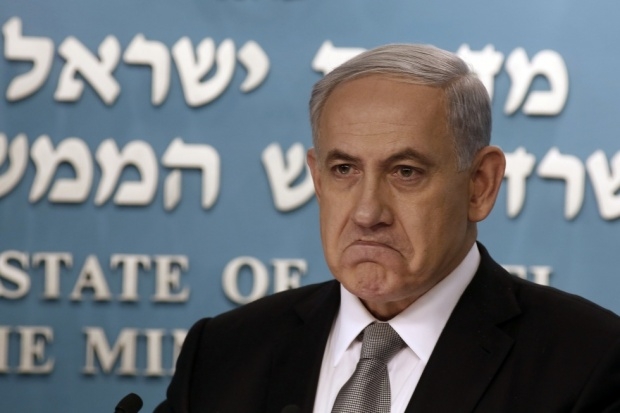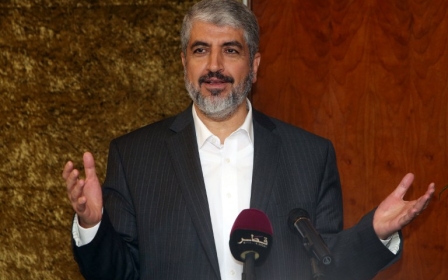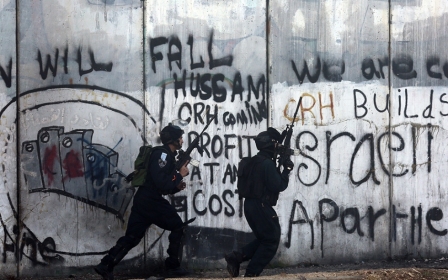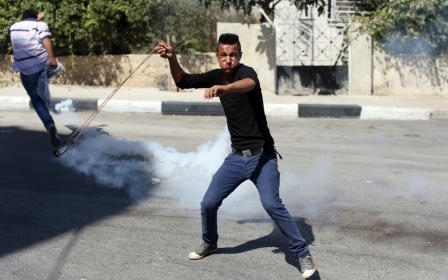The 'anti-terror' law: Israel outdoes itself… again

There is approximately one bright side to the current Israeli approach to the Palestinians - and it is that satirists will never want for inspiration.
Israel’s latest contribution to global absurdity is an “anti-terror” law proposed by Prime Minister Benjamin Netanyahu’s Likud party and targeting Palestinian citizens of Israel and residents of the West Bank and Jerusalem. If passed, it will criminalise holding a Palestinian flag at demonstrations.
A host of other measures are also prescribed. According to the summary of the bill on Israel’s Ynetnews website, these include the following:
- “Those killed during their attempt to conduct a terror attack will not receive a funeral” (their bodies will instead “be buried in an unknown location;”)
- “Terrorists’ houses will be destroyed within 24-hours [sic] of the attack;”
- “Families of terrorists will lose their citizenship and will be deported to Gaza should they express support for their relative's deed.”
Ynetnews goes on to note that, in view of the bill’s drafters, terroristic “[s]upport… can be expressed through public or social media.”
A summary from The Washington Post additionally specifies that persons “convicted of throwing Molotov cocktails or fireworks” would also be eligible for deportation following completion of their prison sentence.
So much for the usual restrictions on travel between Israel and the Gaza Strip - although this potential arrangement would certainly further expose the territory as an “open-air prison.”
To put all of this in a bit of perspective, let’s imagine that the Islamic Republic of Iran were to propose a law according to which the families of citizens who were deemed to have participated in an act of terror against the regime would have their houses demolished.
If family members went as far as to post a Facebook memory of an allegedly terroristic relative slain by the Iranian military, they would be deported to a territory where their own chances for extermination by the same military would drastically increase.
Chances are, in this case, the global community would have some nasty things to say about such legislation and would presumably draw attention to the illegal status of collective punishment under international law. Israeli officials and pundits might even capitalise on the opportunity to condemn the barbaric nature of their Iranian foes.
In the current non-hypothetical case, what’s essential to keep in mind is that Israel’s interpretation of what constitutes terrorism is pretty flexible.
Palestinians slaughtered while ostensibly engaged in acts of terror have ranged from fisherman trying to fish to farmers trying to farm to children trying to play football to children trying to sleep in United Nations-run elementary schools.
'Prevention of terrorism?'
As journalist Patrick Strickland points out in an article for The Electronic Intifada, this would not be the first time that Israel has banned the Palestinian flag. The flag was previously outlawed between 1967 and the signing of the Oslo Accords in 1993, although - in the true spirit of Oslo (i.e., deception and travesty) - Palestinians continue to be intermittently punished for displaying it.
Nor, of course, is this Israel’s first experiment with anti-terror laws. The Prevention of Terrorism Ordinance of 1948 - reproduced on the website of the Israeli Foreign Ministry - decrees that a “‘terrorist organisation” means a body of persons resorting in its activities to acts of violence calculated to cause death or injury to a person or to threats of such acts of violence.”
In other words, the state of Israel is a textbook example of its very own definition of a terrorist organisation. But the ordinance naturally isn’t meant to apply to Israeli state terrorism, Israeli settler terrorism, or any other form of Jew-on-Palestinian violence or threat of violence “calculated to cause death or injury.”
Conveniently, the ordinance also proclaims: “If the [Israeli] Government, by notice in the Official Gazette (the official record of the Israeli State), declares that a particular body of persons is a terrorist organisation, the notice shall serve, in any legal proceeding, as proof that that body of persons is a terrorist organisation, unless the contrary is proved.”
Good luck proving the contrary.
Meanwhile, the fact is that Israeli terror, collective punishment, and general oppression merely breed Palestinian resistance, both nonviolent and violent - with activities like symbolic rock-throwing being lumped into the latter category.
This would seem to indicate that intensifying the routine via the proposed anti-terror law would do nothing to curb Palestinian “terror” as it is conceived by Israel. Rather, what it would do is ensure ongoing strife - which would in turn serve as a justification for further Israeli abuses, denial of Palestinian rights, territorial expansionism, and gargantuan monetary donations from the United States.
After all, who said having enemies isn’t profitable?
And according to the Ynetnews article, the passage of the law would henceforth designate anyone waving the Palestinian flag at protests as the possessor of an “enemy flag.”
State of emergency
So what should we see this proposed law as indicative of: a state that fears for its ability to maintain control over the territory it has auto-appropriated and is thus grasping at whatever hare-brained measures it can, or rather a state that is so convinced of its omnipotence that it fancies itself capable of enacting whatever perverse policies it desires?
Given that one of the defining characteristics of Israel’s modus operandi is its fundamental illogic (apartheid = democracy; terrorism-when-enacted-by-Israelis = self-defence), either explanation is plausible.
Strickland quotes an email from Israeli scholar Ilan Pappé, author of “The Ethnic Cleansing of Palestine,” who argues that, up until recently, Israel “was uncomfortable with the contradiction between racism and democracy,” and that it “hesitated to legislate in [an outright] racist manner since it was possible, in its leaders’ eyes, to practice a de facto apartheid state with laws that were democratic in discourse but discriminatory in nature when implemented.”
Incidentally, an Amazon.com advertisement for Pappé’s book popped up on the side of my computer screen when I was perusing none other than the egregiously right-wing Times of Israel’s report on the proposed bill. The report claims that “even those who do not commit offenses classified as terrorism, such as stone-throwers, “inciters” and masked participants in protests where fireworks are shot or firebombs thrown, will also face harsh penalties.”
Never mind that masks are a somewhat effective antidote to the tear gas regularly unleashed by Israel on children and other cohorts of the Palestinian population. Cheers to the internet for creepily determining my own personal orientation vis-à-vis the Palestinian-Israeli issue - although the Times of Israel would certainly beg to differ.
The Times also remarks that, “[i]f passed by the Knesset, the [anti-terror] bill will act as a sort of emergency legislation that would expire once the crisis has subsided.”
Hence the utility of an eternal “crisis.” But the actual “crisis,” if one is to base one’s judgments on Pappé’s manuscript and on reality itself, is that Israel’s crimes continue to this day.
A 1980 amendment to the Israeli Prevention of Terrorism Ordinance stipulates that “[t]his Ordinance shall only apply in a period of Ordinance. in which a state of emergency exists in the State [sic].”
If only the ethnic cleansing of Palestinians were considered a state of emergency.
- Belen Fernandez is the author of The Imperial Messenger: Thomas Friedman at Work, published by Verso. She is a contributing editor at Jacobin magazine.
The views expressed in this article belong to the author and do not necessarily reflect the editorial policy of Middle East Eye.
Photo: Israeli premier Benjamin Netanyahu during a televised address in December, formally announcing a new election (AFP).
New MEE newsletter: Jerusalem Dispatch
Sign up to get the latest insights and analysis on Israel-Palestine, alongside Turkey Unpacked and other MEE newsletters
Middle East Eye delivers independent and unrivalled coverage and analysis of the Middle East, North Africa and beyond. To learn more about republishing this content and the associated fees, please fill out this form. More about MEE can be found here.





